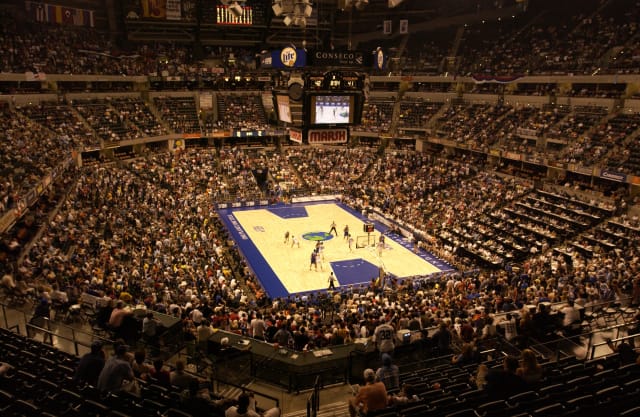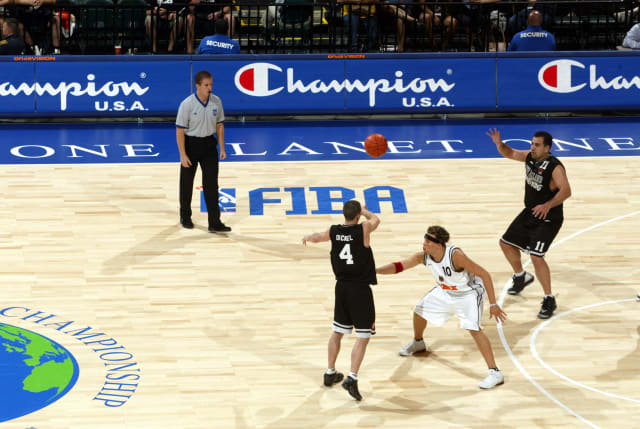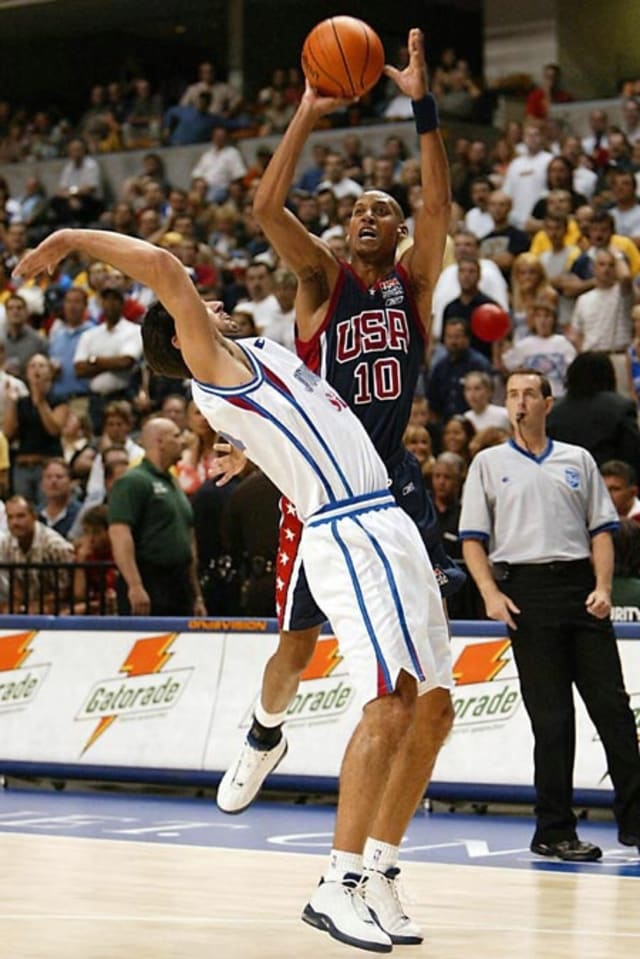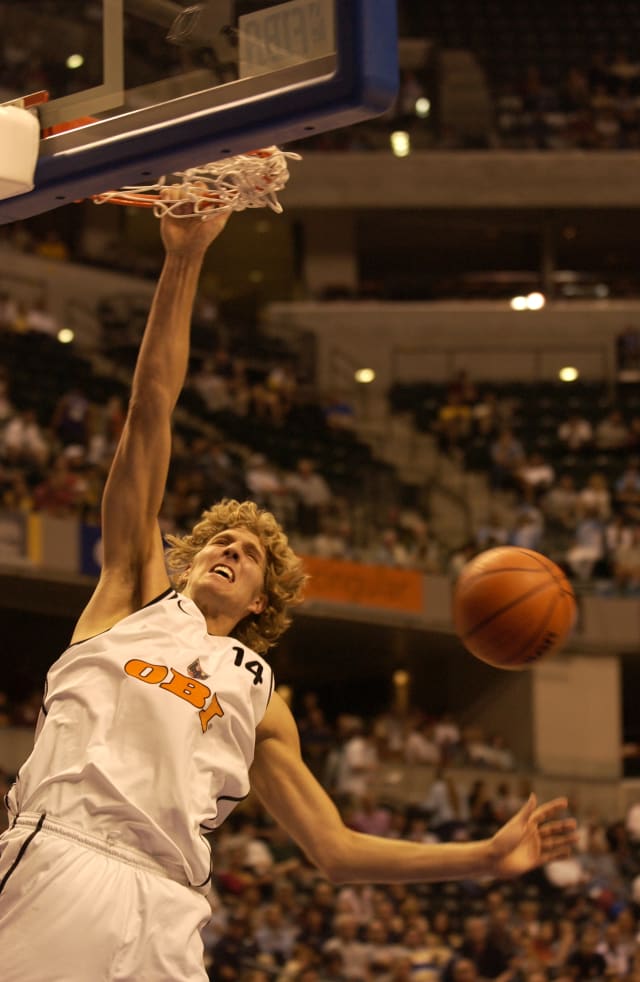The Best of 2002 World Cup: Yugoslavia first repeat champs since 1963
Yugoslavia became the first repeat world champion since 1963 as they outlasted Argentina in overtime in the Final. Germany took third place while USA lost their first games in FIBA play with NBA players.
MIES (Switzerland) - Yugoslavia became the first back-to-back World Champions since 1963 as they outlasted Argentina in overtime of the Final of the FIBA Basketball World Cup 2002 - a tournament that was overshadowed by the downfall of the USA.
In the first World Cup held in the United States, the USA lost their first international games with NBA players on board and ended up in sixth place. Yugoslavia meanwnhile matched Brazil's repeat from 1959 and 1963 and Argentina finished second to take the podium for the first time since winning the first World Cup in 1950. Germany knocked off New Zealand for third place - the Europeans' debut in the top three of the World Cup.
The best team: Yugoslavia
| Rank | Team | W-L |
| 1. | Yugoslavia | 7-2 |
| 2. | Argentina | 8-1 |
| 3. | Germany | 6-3 |
| 4. | New Zealand | 4-5 |
| 5. | Spain | 7-2 |
| 6. | USA | 6-3 |
| 7. | Puerto Rico | 6-3 |
| 8. | Brazil | 4-5 |
| 9. | Turkey | 4-4 |
| 10. | Russia | 3-5 |
| 11. | Angola | 2-6 |
| 12. | China | 1-7 |
| 13. | Canada | 2-3 |
| 14. | Venezuela | 1-4 |
| 15. | Algeria | 1-4 |
| 16. | Lebanon | 0-5 |
The FIBA Basketball World Cup embarked in unchartered waters in 2002 as basketball's birthplace USA hosted the event for the first time. The 14th edition took place in Indianapolis from August 29 to September 28.
For the fourth consecutive tournament, the World Cup included 16 nations: hosts USA, the top five qualified teams from Europe - Yugoslavia, Turkey, Spain, Germany, Russia; the top five sides from FIBA Americas (five because USA were 2000 Olympic champions and would have earned an automatic spot) - Argentina, Brazil, Canada, Puerto Rico, Venezuela); the top two teams from Asia - China, Lebanon; the top two nations from Africa - Angola, Algeria; and Oceania champions New Zealand.

The 16 nations were drawn into four groups of four teams with round robin play. The top three finishers in each group advanced to a second group stage with two groups of six teams. And the top four of those two advanced to the knockout stage starting with the Quarter-Finals.
Spain, Brazil, United States and Argentina all went 3-0 to win their respective groups. Among the first group stage highlights were Spain knocking off Yugoslavia 71-69 in Group A; Brazil beating Turkey 88-86 in Group B on a buzzer-beater three-pointer from Marcelinho Machado; and New Zealand rallying from 14 points down at halftime to defeat Russia 90-81 in Group D. Yugoslavia and Angola advanced from Group A; Puerto Rico and Turkey from Group B; Germany and China from Group C and New Zealand and Russia from Group D.
 Mark Dickel passing to Pero Cameron of New Zealand
Mark Dickel passing to Pero Cameron of New Zealand
In the second group stage, Puerto Rico pulled off an 85-83 upset of Yugoslavia and then upended Spain as well 73-65 with a 24-13 fourth quarter. Puerto Rico ended up taking first place in Group E followed by Spain, Yugoslavia and Brazil. In Group F, the only surprise came in the final game as Argentina shocked USA 87-80. It was the first defeat of a USA team made up of NBA players since FIBA opened international competitions to those players dating back to 1992. USA had won 58 straight games at the 1994 and 2002 World Cups and 1992, 1996 and 2000 Olympics. Argentina won the group ahead of USA, Germany and New Zealand.
More surprises came in the Quarter-Finals as New Zealand shocked Puerto Rico 65-63 and then Germany knocked off Spain 70-62. Argentina took care of business against Brazil by 11 points, but USA lost again 81-78 to Yugoslavia - wasting a 10-point lead with under 7 minutes to play. USA would beat Puerto Rico in the Classification 5-8 but then lost a third time to Spain to finish sixth overall.
 Reggie Miller of USA
Reggie Miller of USA
Yugoslavia ended New Zealand's fairytale in the Semi-Finals with an 89-78 win - but only after coming back from a 48-39 deficit at halftime. Argentina fought off Germany 86-80 to reach their first Final in 52 years. Germany secured their first spot on the podium as they out-raced New Zealand 117-94.
The Final was a thriller as Yugoslavia fought back late and sent the game to overtime and ended up prevailing 84-77. The 1998 World Cup MVP Dejan Bodiroga led the way with 27 points and Predrag Stojakovic poured in 26 points while Fabricio Oberto collected 28 points and 10 rebounds in the loss. Argentina star Manu Ginobili was limited to 0 points in 12 minutes as he fought with an injury from the Semi-Finals. In the end, it was Yugoslavia celebrating the repeat title.
The best player: Dirk Nowitzki, MVP
The Most Valuable Player trophy went to Dirk Nowitzki for his outstanding performance in getting Germany to the podium for the first time in grabbing third place. He led the tournament in scoring with 24.0 points per game and was tied for fifth in rebounding with 8.2 boards. He also picked up 2.7 assists, 1.2 steals and 2.0 blocks per game.
 Dirk Nowitzki
Dirk Nowitzki
The 24-year-old Nowitzki started off in fine fashion with 30 points in a win over China and then tallied 34 points and 10 rebounds in a loss to USA. He followed that with 24 points in the final first round game against Algeria and began the second group stage with 17 points versus New Zealand.
Germany dropped their second game despite Nowitzki picking up 21 points and 10 rebounds against Argentina., and had another double-double (17/10) versus Russia.
Nowitzki collected 20 points as Germany surprised Spain in the Quarter-Finals. But his 24 points and 11 rebounds were not enough as Germany fell a second time to Argentina - this time in the Semi-Finals. Nowitzki did not let his country down in the game for third place with 29 points and 8 rebounds to beat New Zealand and reach the podium.
Nowitzki was joined on the All-Tournament Team by Predrag Stojakovic of Yugoslavia, Manu Ginobili from Argentina, New Zealand big man Pero Cameron and Chinese center Yao Ming.
The best game: Yugoslavia v Argentina, Final
The Final between Yugoslavia and Argentina would be historic regardless of who won - either Yugoslavia would become the first champion to repeat since Brazil in 1963 or Argentina would win their second title and first since 1950.
The game in front of 17,000 fans at Indianapolis' Conseco Fieldhouse saw a back and forth first quarter with 7 ties and 4 lead changes with Yugoslavia scoring 8 of the last 9 points of the first quarter to lead 24-19. The second quarter saw Predrag Stojakovic and Luis Scola hold their teams close and Scola picked up his fourth foul with 7.6 seconds left in the first half. And the Europeans went into the break ahead 41-39.
Fabricio Oberto took over for Argentina and sparked a 9-0 spurt to take the biggest lead of the game 53-43 midway through the third quarter. Argentina had an answer any time Yugoslavia tried to get close and led 57-52 after 30 minutes.
The fourth quarter was the Dejan Bodiroga show as the Yugoslavia star did all he could to bring his country back, hitting two three-pointers among his 16 points in the quarter. Argentina led 74-66 with under 3 minutes to play and Bodiroga scored on the next three possessions to make it 74-73. Oberto could only split two free throws with 29 seconds and then Bodiroga knotted the game 75-75 with 17 seconds.
Vlade Divac failed to close the game as he missed two free throws with 5.9 seconds and Hugo Sconochini got the ball and raced ahead and to the basket but no foul was called to send the game to overtime. It was just the second World Cup Final to go to overtime following 1978.
Neither team scored in the early going of the extra session but Stojakovic drained a three-pointer and Bodiroga added two free throws. Oberto finally made two free throws with 45 seconds to play for Argentina's first points but Stojakovic countered with two from the foul line for an 82-77 cushion with 17 seconds to play.
Besides Marko Jaric's final foul shots in the closing seconds, Bodiroga and Stojakovic combined to score 28 of Yugoslavia's 32 points in the final 15 minutes. Bodiroga finished with 27 points and Stojakovic had 26 points. Fabrico Oberto collected 28 points and 10 rebounds in a losing effort. Argentina star Manu Ginobili was limited with an injury and ended up playing 12 minutes but did not score and grabbed 1 rebound.
The biggest story: first loss for USA with NBA players
While New Zealand reaching the Semi-Finals certainly was a shocking result from the 2002 World Cup, the biggest story was USA's three losses in their final four games and sixth place despite a team full of NBA players.
George Karl was coaching a USA team including Reggie Miller, Paul Pierce, Shawn Marion, Baron Davis, Elton Brand, Jermaine O'Neal and Ben Wallace. And the Americans rolled through their first five games with an averaging winning margin of 31.6 points.
The competition apparently did not prepare the Americans for Argentina, who built a 20-point cushion and ended up winning 87-80.
The loss snapped USA's perfect record of 58-0 in using NBA players in FIBA global competitions since 1992 - a streak that saw them win the 1992, 1996 and 2000 Olympics as well as the 1994 World Cup. There was an NBA lockout in 1998 which kept NBA players out of the World Cup, where USA finished third.
 USA's Paul Pierce
USA's Paul Pierce
Karl and co. took second place in the group yet still were on course for the title. But those hopes went up in smoke as Yugoslavia rallied from 10 points down with under 7 minutes left to win 81-78 in the Quarter-Finals.
Relegated to the Classification 5-8 pool, USA bounced back with an 84-74 win over Puerto Rico. But the Americans suffered a third loss in four games as Spain beat them 65-56 and USA finished sixth. It was the Americans' worst-ever showing in World Cup history.
The best performance: Yao Ming
Usually this section describes the performance of the World Cup's leading scorer. But since the leading scorer Dirk Nowitzki ended up being MVP, we will look at the performance of Yao Ming.
It had been a while since the United States had seen Yao as the China star center had just turned 20 years old when the Americans beat China 119-72 in the opening game of the 2000 Olympics - Yao's first major senior tournament. He tallied 5 points, 3 rebounds, 2 assists and 2 blocks in 16 minutes in that game.
 Yao Ming
Yao Ming
Fast forward nearly two years and Yao represented something entirely different upon his arrival for the World Cup. Two months earlier he was selected No. 1 in the 2002 NBA Draft by the Houston Rockets as the first international player ever to be selected first overall without having previously played college basketball in the USA. Yao also immediately rose the interest of the NBA in China - even though he had yet to play a game for the Rockets. In fact, Yao missed Houston's pre-season training camp for the World Cup.
All eyes were on Yao at the World Cup, and the giant from Shanghai did not disappoint. After scoring 16 points in his first game against Germany, Yao scored a tournament high 38 points with 13 rebounds and 8 blocks against Algeria. He was held to 10, 11 and 13 points the next three games before finishing strong with 27 points against New Zealand, 26 points and 14 rebounds versus Turkey and 27 points and 15 rebounds the final game against Angola.
Stats leaders
Points
| Player (country) | Points Per Game |
| Dirk Nowitzki (Germany) | 24.0 |
| Victor Diaz (Venezuela) | 22.0 |
| Yao Ming (China) | 21.0 |
| Marcelinho Machado (Brazil) | 20.9 |
| Paul Pierce (Spain) | 19.8 |
Rebounds
| Player (country) | Rebounds Per Game |
| Richard Lugo (Venezuela) | 12.2 |
| Mirsad Turkcan (Turkey) | 10.3 |
| Yao Ming (China) | 9.2 |
| Joseph Vogel (Lebanon) | 9.0 |
| Dirk Nowitzki (Germany) | 8.2 |
| Daniel Santiago (Puerto Rico) | 8.2 |
Assists
| Player (country) | Assists Per Game |
| Carlos Arroyo (Puerto Rico) | 6.4 |
| Mark Dickel (New Zealand) | 4.6 |
| Miloud Doubal (Algeria) | 4.6 |
| Fadi El Khatib (Lebanon) | 4.4 |
| Yumering Mijares (Venezuela) | 4.4 |
FIBA